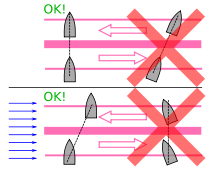Is a cultural difference at the heart of the Marc Guillemot and Vendée Globe collision regs debacles?
When French sailor Marc Guillemot appeared in court today to answer charges of sailing the wrong way in the Dover Strait and Sunk TSS, the case highlighted what may be a (costly) cultural chasm. Other professional sailors beware.
Guillemot joins an elite group of other prosecuted sailors over the years who flouted the regs at Dover: Angus Primrose; Grant Dalton; and Antoine Koch.
There seems to be a difference of perspective on the importance of collision regulations. I say this because I see a connection between the long-running Guillemot saga and the more recent protest brouhaha in the Vendée Globe over boats that entered the TSS off Cape Finisterre.
That resulted in much vitriol being poured on poor Alex Thomson, who raised the protest, on the French website while the English version was, by contrast, all reasoned acceptance and even praise that Thomson was sticking by the rules of the race and of the collision regulations.
So please anyone French correct me if I’m wrong, but the division of responses makes me think perhaps the English are more content to accept the letter of the law and the French somewhat more inclined to think of it as ‘guidance’.
To be fair, on the UK side, we know that the Maritime and Coastguard Agency is not a body to be trifled with. Like it or not, they have powers that would make your eyes water. Ignore them or pretend you don’t understand too well ze English and you’ll soon be hearing from them, as Marc Guillemot found out.
The sailors of the Vendée Globe and other short-handed classics are stars in their world, deservedly, and the French respect and generally revere their passion for the sea. From what I can judge, many French race followers think sailors on a mission should, as such, be given a dispensation.
Maybe there’s a case sometimes, but the lesson is that this isn’t likely to happen off Dover, even if applied in for in advance, in triplicate, and filed on form CG66.
On these shores, as the 17th Century historian Thomas Fuller wrote, the prevailing philosophy is: ‘Be ye ever so high, still the law is above you.’




